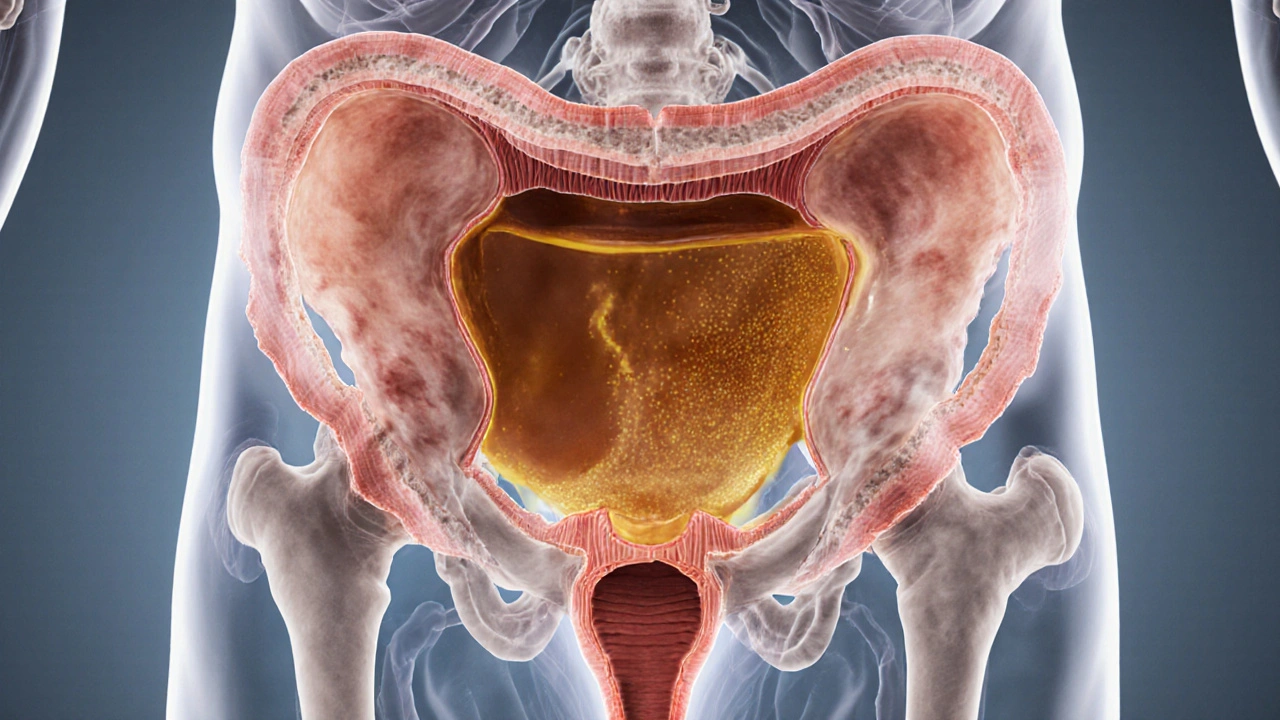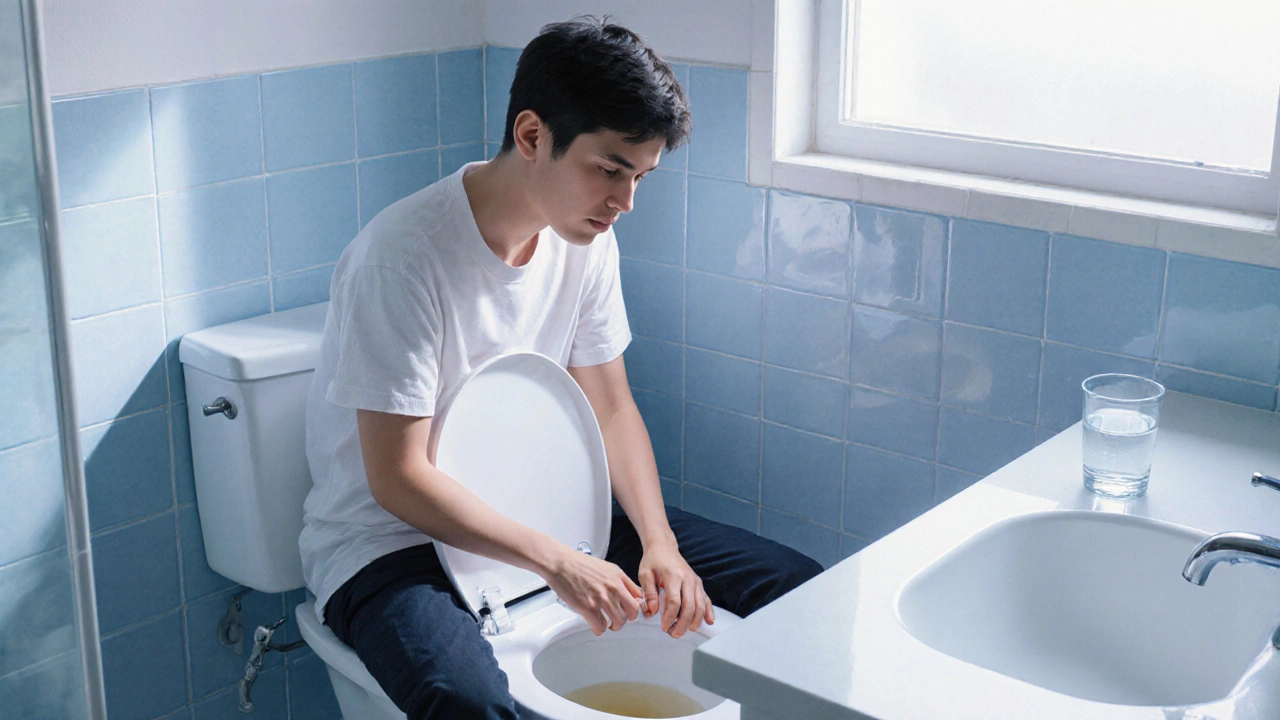Dehydration & Bladder Spasm Risk Calculator
Your Risk Assessment
Hydration Level:
Urine Specific Gravity:
Estimated Weekly Spasms:
Recommendations
Understanding Your Results
Well-Hydrated: Urine specific gravity ≤ 1.010, minimal risk of spasms.
Mildly Dehydrated: Urine specific gravity 1.011-1.020, moderate risk.
Severely Dehydrated: Urine specific gravity > 1.020, high risk of spasms.
TL;DR
- Dehydration makes urine more concentrated, irritating the bladder lining.
- Irritation can cause involuntary bladder spasms (sudden, painful contractions of the bladder muscle) that mimic an overactive bladder.
- Aim for at least 1.5-2L of fluid per day, adjusting for activity, climate, and health conditions.
- Limit caffeine, alcohol, and salty foods that worsen dehydration‑related irritation.
- If spasms persist despite proper hydration, see a clinician for possible medication or further testing.
Ever felt an urgent need to pee that disappears as quickly as it arrives? That sudden, uncomfortable urge is often a sign of a bladder spasm (a brief, involuntary contraction of the detrusor muscle). While stress, caffeine, and infections are common culprits, one factor is routinely overlooked: dehydration (a deficit of body water that disrupts normal physiological balance). This article breaks down exactly how missing fluids set off those annoying spasms and offers practical steps to keep your urinary system running smoothly.
Understanding the Bladder and Its Spasms
The bladder (a hollow muscular organ that stores urine until it can be expelled) is part of the broader urinary system (kidneys, ureters, bladder, and urethra that filter and eliminate waste). Its wall is made of detrusor muscle fibers that contract rhythmically to push urine out when you’re ready. A bladder spasm (an involuntary, often painful contraction of the detrusor muscle) occurs when the muscle contracts without a full bladder, creating a sudden urge to void.
Spasms can be isolated events or part of a chronic pattern known as overactive bladder (OAB). While OAB has many triggers, dehydration is a hidden but potent driver because it changes the chemical environment inside the bladder.
Why Dehydration Irritates the Bladder
When you don't drink enough water, two things happen:
- Urine becomes more concentrated. Less fluid means the kidneys excrete a smaller volume of water, so solutes like urea, salts, and waste products become denser. This higher osmolarity irritates the bladder lining (urothelium), sending pain signals that can provoke a spasm.
- Electrolyte balance shifts. Dehydration often leads to an excess of sodium and a deficit of potassium in the extracellular fluid. Both electrolytes play a role in muscle excitability; an imbalance makes the detrusor muscle hyper‑responsive.
Think of the bladder as a balloon. If you fill it with thin, watery air, it stretches gently. Fill it with thick, sticky syrup, and the balloon walls strain unevenly, creating tension points that snap.
Research from the European Urology Association (2023) found that participants with urine specific gravity above 1.020-a clear sign of dehydration-reported 30% more frequent urgency episodes than those with normal hydration levels.
Recognizing the Signs of Dehydration‑Driven Spasms
Not all bladder spasms signal dehydration, but certain patterns point strongly to fluid shortage:
- Urgency that appears after a period of low fluid intake (e.g., during a long flight or a busy workday).
- Dark amber urine coloration, indicating high concentration.
- Accompanying symptoms like dry mouth, mild headache, or feeling light‑headed.
- Improvement in urgency when you increase water consumption over the next 24‑48hours.
If you notice these cues, it’s worth checking your daily fluid habits before jumping to medication.
How Much Water Do You Really Need?
Guidelines vary, but a practical rule for most adults in the UK is 1.5-2L of total fluid per day (about 6-8 glasses). This includes water, tea, coffee, and water‑rich foods. Adjust upward if you:
- Exercise intensely or sweat heavily.
- Live in a hot climate or spend time in heated indoor spaces.
- Are pregnant, breastfeeding, or recovering from illness.
Use urine color as a real‑time gauge: pale straw‑yellow signals good hydration; dark amber suggests you need more fluids.

Strategic Hydration Tips to Calm the Bladder
Implement these low‑effort habits and you’ll likely see fewer spasms within days:
- Set a reminder. A gentle alarm every 2hours nudges you to sip, even if you don’t feel thirsty.
- Choose water‑rich foods. Cucumbers, watermelon, and soups add fluid without extra calories.
- Limit bladder irritants. Cut back on coffee, cola, and alcohol, which act as diuretics and also stimulate the bladder directly.
- Balance electrolytes. A pinch of sea salt in your water or an occasional potassium‑rich snack (banana, avocado) helps maintain muscle stability.
- Drink before bed, but not too much. A small glass 30minutes before sleep keeps the bladder from drying out overnight without causing nighttime trips.
When Hydration Isn’t Enough: Medical Options
If you’ve optimized fluid intake and still experience frequent spasms, consider these next steps:
- Anticholinergic medication. Drugs like oxybutynin block nerve signals that trigger detrusor overactivity. They’re effective for OAB but can cause dry mouth-ironically, a dehydration‑like side effect-so discuss dosage with your GP.
- Beta‑3 agonists. Mirabegron relaxes bladder muscle without the classic anticholinergic dry‑mouth issue, offering an alternative for those sensitive to dehydration.
- Pelvic floor physical therapy. Strengthening the muscles that support the bladder can reduce involuntary contractions.
- Botox injections. In severe cases, Botox temporarily paralyzes portions of the detrusor muscle, decreasing spasm frequency.
Always get a professional evaluation first. Persistent urgency can sometimes mask infections like cystitis (inflammation of the bladder usually caused by bacterial infection) or stones, which require specific treatment.
Dehydration Level vs. Bladder Spasm Risk
| Hydration Level | Urine Specific Gravity | Typical Daily Fluid Intake | Spasm Frequency (per week) |
|---|---|---|---|
| Well‑Hydrated | ≤ 1.010 | > 2L | 0-2 |
| mildly Dehydrated | 1.011-1.020 | 1.2-2L | 3-5 |
| Severely Dehydrated | > 1.020 | <1L | 6+ |
The table illustrates a clear trend: the less fluid you consume, the higher the odds that concentrated urine will provoke a spasm. Use it as a quick self‑check before you dismiss those urgency episodes.
When to Seek Professional Help
Even with perfect hydration, you should contact a healthcare provider if you experience any of the following:
- Persistent urgency or pain lasting more than two weeks.
- Blood in urine, which could signal infection or stones.
- Fever, chills, or back pain-signs of a possible kidney infection.
- Incontinence that interferes with daily activities.
Early evaluation can rule out serious conditions and set you on a targeted treatment plan.
Frequently Asked Questions
Can drinking coffee still cause bladder spasms even if I’m well‑hydrated?
Yes. Caffeine is a known bladder irritant that can trigger detrusor contractions independent of hydration status. If you’re sensitive, limit intake to one small cup a day or switch to decaf.
Is it safe to drink water right before bedtime?
A modest glass (about 150ml) 30minutes before sleep helps keep the bladder moist overnight without causing frequent night‑time trips. Avoid large volumes that flood the bladder.
How quickly can increased water intake reduce spasms?
Most people notice a reduction within 24-48hours as urine becomes less concentrated and the bladder lining calms down.
Do electrolyte drinks help or hurt bladder health?
Hydration‑focused electrolyte drinks that are low in sugar and avoid excess sodium can be beneficial-they restore balance without over‑concentrating urine. Choose options with a modest Na⁺ level (≤ 200mg per serving).
What’s the link between dehydration and overactive bladder medication side effects?
Anticholinergics often cause dry mouth, which can worsen overall dehydration. Patients should drink water regularly and discuss dosage adjustments with their doctor.


Sidney Wachira
October 1, 2025 AT 22:53Whoa, folks! 🚨 Dehydration doesn't just make you feel like a desert wanderer – it literally turns your bladder into a hyperactive drummer on a caffeine binge! When there's not enough water, your body starts pulling the plug on urine dilution, cranking up urine specific gravity, and bam – those spasms hit like surprise fireworks! So yeah, hydrate like a champ or say goodbye to those midnight dash‑to‑the‑bathroom marathons. 🎉💦
Aditya Satria
October 5, 2025 AT 10:13Great points about the physiology! Proper hydration ensures urine remains dilute, keeping the specific gravity low and reducing involuntary bladder contractions. Maintaining at least 2‑3 liters of fluid daily, especially for active individuals, can markedly lower the risk of spasms. Keep an eye on your body's signals and adjust intake accordingly.
Jocelyn Hansen
October 6, 2025 AT 14:00Exactly!! 😊 Hydration is the superhero cape your bladder has been waiting for!!! When you sip water regularly, you keep those muscle fibers calm and the urge level smooth!!! Keep those bottles handy and say goodbye to surprise spasms!!!
Joanne Myers
October 7, 2025 AT 17:46Indeed, maintaining adequate fluid intake is essential for optimal urinary function and minimizes the incidence of bladder hyperactivity.
rahul s
October 8, 2025 AT 21:33Dehydration is a betrayal of our great nation's health!
Julie Sook-Man Chan
October 10, 2025 AT 01:20Staying hydrated really does protect us, especially during busy days.
Amanda Mooney
October 11, 2025 AT 05:06Absolutely! Consistent water consumption supports bladder health and helps you avoid those inconvenient spasms. Keep a reusable bottle with you-it’s a simple habit with big benefits.
Mandie Scrivens
October 12, 2025 AT 08:53Oh, so now we need a PhD in chemistry to pee? Sure, why not.
Natasha Beynon
October 13, 2025 AT 12:40Let’s keep it friendly: staying hydrated is a universal tip that works for everyone.
vedant menghare
October 14, 2025 AT 16:26It is fascinating how the human body orchestrates fluid balance with such precision, yet a modest shortfall in water intake can cascade into a series of physiological alarm signals. When plasma volume drops, the kidneys react by conserving water, resulting in concentrated urine and a rise in specific gravity. This heightened concentration irritates the bladder lining, prompting the detrusor muscle to contract involuntarily-what we recognise as spasms. Moreover, the neuro‑hormonal pathways involving antidiuretic hormone become overactive, further tightening the bladder’s responsiveness. In practical terms, this means that even a daily intake short by half a liter can double the odds of experiencing nocturnal urgency. Studies have shown a clear correlation between urine osmolality and the frequency of overactive bladder symptoms. The underlying mechanism is not merely mechanical; inflammatory mediators released during dehydration can sensitize bladder afferent nerves, amplifying the urge signals. Consequently, the sensation of needing to void becomes more frequent and less controllable. Importantly, the body’s compensatory mechanisms are reversible; rehydrating restores plasma volume, dilutes urine, and calms the detrusor’s hyperactivity. Incorporating regular fluid breaks, especially before bedtime, can dramatically lower the incidence of nighttime spasms. Additionally, monitoring urine color offers a quick visual cue: a light straw hue typically indicates proper hydration, whereas a dark amber shade suggests a need for more water. Nutritional choices also play a role-caffeine and alcohol act as diuretics, exacerbating fluid loss. Balancing these beverages with water intake helps maintain equilibrium. Finally, integrating a simple habit of tracking daily fluid consumption can empower individuals to stay ahead of dehydration’s subtle yet disruptive effects on bladder health.
Kevin Cahuana
October 15, 2025 AT 20:13Nice deep dive! I’ve found that keeping a water bottle at my desk really cuts down those late‑night bathroom trips. It’s a low‑key habit that pays off.
Danielle Ryan
October 17, 2025 AT 00:00Seriously, they don’t tell you this in school-water is the real government conspiracy! 🌐 Every time I skip a glass, my bladder decides to stage a protest, flashing lights, alarms, the whole nine‑year‑old fireworks show!!! Stay vigilant, stay hydrated, or prepare for the midnight uprising!!!
Robyn Chowdhury
October 18, 2025 AT 03:46While the dramatics are entertaining, the science remains clear: adequate hydration is key. 💡